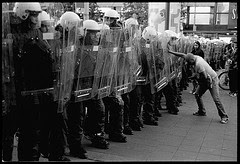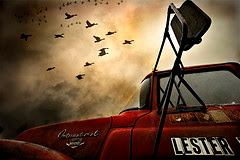My students usually always prove my "rule of 75" almost a scientific fact. You see, I would like to think my world and American history students, long after their June departure from Room 112, would remember the details of the all of the Amendments, the hajj of Mansa Musa, the great battles of Alexander the Great and Charles Martel, the spirited national debate over the Scopes Trial or Sacco & Vanzetti or even the legacy of FDR's New Deal. But the reality is that they will forget 75% of what they learned in the 180 days we have together the moment they walk out the door. I like to think that they will remember a few over-arching themes like "American Ideals" and "Empathy" and the difference between primary & secondary resources. But, as I have found over the last five years of teaching and coaching wrestling is that students have a few of my sayings wood-burned into their psyches.
On the first day of school during my syllabus/welcome/procedure spiel I tell them that all papers & assignment are due on their assigned dates. Furthermore, I tell them, even in the case of Lake Michigan tidal wave, an al-Qaeda virus that renders all Forest Hills Public Schools computers powerless, or even if their printer (wait for this...) runs out of printer ink, that when "faced with an obstacle, they are to improvise, adapt and overcome!" The students get a chuckle and I get to make a point and then use it as a refrain anytime a student gives the "my computer crashed last night, I swear" excuse. The saying is one of about five or six sayings that I think will be my legacy...Most of them are barrowed (a couple of them are actual originals) from either my dad, who taught in city schools for thirty-five years, my host teacher at Rockford High School or one of my wrestling coaches.
Every now and again however, I am forced to make the announcement to my students, "I have some bad news, the smart board is not working today so we will have to 'improvise (they chime in here), adapt & overcome!" It's nice, because they understand and I understand that things do happen and when you have thirty or more eyes on you to expose every bead of sweat and frustration over an otherwise awesome lesson plan gone awry, that you can and must move on to the infamous "Plan B".
Technology, among the many tools in my teaching tool box, is perhaps the tool that fails me most. It never ceases to amaze me that when I find a fantastic 2-minute clip about the Aztec capital city Tenochtitlan that the school district's streaming video is down. Or, I get ready to use my polyvision board (a smart board) for an interactive lesson and then it freezes up. I love technology...I host two websites (one for my wrestling team and one for my classroom), I frequently scout wrestling on a popular video site call flowrestling, I post youtube videos and I have even tinkered with online radio/podcasts, but I know that technology is best when it is treated as a luxury, not the bedrock of lesson or curriculum. We depend on an online grading system in my district and that too will fail and "go down" from time to time...It is the source of much ire in our building.
The more I teach, the more I realize something my father said when I was bragging about all the cool, new technoclassroom items I was being awarded, "The best teachers only need a chalkboard and textbook, the really good ones," he continued, "just need a stick and clear spot in the sand." And you know, he's right. My textbooks never fail me, my whiteboard and markers rarely fail me (sometimes the caps get left off by students writing greetings on my boards) and the good old college-ruled outline notes (although unpopular) never let me down. I've gone full circle, professionally, envisioning a paperless classroom full of online student learners and wise facilitator (me) directing and urging the learning all the way to saying "we're going old school--take out your map hand-outs, coloring pencils & notes packet." I have yet to find an appropriate happy medium that meets the needs of a technology centered "Entitlement Generation" while giving them a framework for basic content knowledge. I welcome technology but am always skeptical of its innate ability to fail me at the worst moment...
Technology can be a bastion of inspiration in the classroom or a source of irritation...It just depends on the day. If I were really smart, I'd find a stick and some sand.
Tuesday, January 26, 2010
What's a lame teacher do? (Wikipedia post)
Wikipedia is a double-edged sword for educators. As a world history and American history teacher I know all too well the conveniences & pitfalls of the user-friendly (albeit circuitous) buffet of information. There truly is something for everyone and anything. Many a sophomore and junior, that have graced the windowless cave called Anderson's room, have not-so-skillfully executed the "cut-and-paste" from Wikipedia strategy. My sixteen year old students are no different than anybody elses...Give them an assignment on assessing the current status of American ideals (set forth in the Declaration of Independence) and you will get an artfully crafted together work of wiki-magic. If you're not careful (or not paying attention) as a teacher, students can get away with papers that are almost purposefully a little flawed so as to get away with the Wikipedia generated paper. Even better, tell a student to read "All Quiet on the Western Front" by Erich-Maria Remarque (or heck, even watch the movie) and they go straight for old faithful, the source that never disappoints...an online Mecca of information, factoids & questionable chronology at their fingertips.
Even this past week I squirmed in my chair as I read two separate essays from two different classes that tastefully lamented the struggle of Dustbowl farmers and the boys of the Civilian Conservation Corps. Word for word, line by line, I wasn't reading a Johnny Q. Student original treatise, I was reading a printed out wikipedia article. It was right before the holiday break when students tend to slide a little and my guess is, a few key strokes and mouseclick was the solution to my assignment. I do tell my students to "when faced with an obstacle, improvise, adapt & overcome", but I think they added a corollary "when its midnite before Mr. Anderson's essay is due and I have been played C.O.D. (Call of Duty to us lame teachers) all night, visit wikipedia or facebook for the answers." It's scary how the students walking the halls of my school (not unique from those walking the halls of Cadillac or Farmington Hills) are out-pacing their teachers in knowledge, know-how and literacy of technology. And they know it too...
But, like I said, wikipedia is double-edged sword. It can and does provide a convenient, cursory look at some basic content. With the correct instruction and preparation, students can use this online source with a discerning eye and compare & contrast prior knowledge and learned content. For instance, this week in American History, my students are filling out charts on the heroic and nefarious historical characters of World War II. I do allow them to cross-reference their info on Benito Mussolini, Francisco Franco & Omar Bradley with wikipedia, primarily because they are only given two or three paragraphs (or maybe only a small blurb) in the TCI History Alive text we use. They can also use it to help them fill-out timeline sheets that I assign and develop a basic schema of cause & effect during the late 1930s and 1940s...They can read a little more about how remilitarization of the Rhineland and the invasion of the Sudetenland happen, cross reference it with other suggested & teacher-approved sites (like http://www.bbc.co.uk/history/). Sometimes my students who ate their Wheaties for breakfast can catch the inaccuracies. That then provides a teachable moment. We line up the TCI History Alive book, another credible website and then wikipedia. It is usually a two sources to one victory for the secondary source & the other valid source. I don't have to say a word. Except maybe a few minutes later I do say,"When you go to college and write a paper, make sure that wikipedia.com does not show up in your works cited."
I never see them really, but I know that comment is greeted with more than a few eye rolls. What's a lame teacher to do?
Works Cited
http://www.bbc.co.uk/history/
Even this past week I squirmed in my chair as I read two separate essays from two different classes that tastefully lamented the struggle of Dustbowl farmers and the boys of the Civilian Conservation Corps. Word for word, line by line, I wasn't reading a Johnny Q. Student original treatise, I was reading a printed out wikipedia article. It was right before the holiday break when students tend to slide a little and my guess is, a few key strokes and mouseclick was the solution to my assignment. I do tell my students to "when faced with an obstacle, improvise, adapt & overcome", but I think they added a corollary "when its midnite before Mr. Anderson's essay is due and I have been played C.O.D. (Call of Duty to us lame teachers) all night, visit wikipedia or facebook for the answers." It's scary how the students walking the halls of my school (not unique from those walking the halls of Cadillac or Farmington Hills) are out-pacing their teachers in knowledge, know-how and literacy of technology. And they know it too...
But, like I said, wikipedia is double-edged sword. It can and does provide a convenient, cursory look at some basic content. With the correct instruction and preparation, students can use this online source with a discerning eye and compare & contrast prior knowledge and learned content. For instance, this week in American History, my students are filling out charts on the heroic and nefarious historical characters of World War II. I do allow them to cross-reference their info on Benito Mussolini, Francisco Franco & Omar Bradley with wikipedia, primarily because they are only given two or three paragraphs (or maybe only a small blurb) in the TCI History Alive text we use. They can also use it to help them fill-out timeline sheets that I assign and develop a basic schema of cause & effect during the late 1930s and 1940s...They can read a little more about how remilitarization of the Rhineland and the invasion of the Sudetenland happen, cross reference it with other suggested & teacher-approved sites (like http://www.bbc.co.uk/history/). Sometimes my students who ate their Wheaties for breakfast can catch the inaccuracies. That then provides a teachable moment. We line up the TCI History Alive book, another credible website and then wikipedia. It is usually a two sources to one victory for the secondary source & the other valid source. I don't have to say a word. Except maybe a few minutes later I do say,"When you go to college and write a paper, make sure that wikipedia.com does not show up in your works cited."
I never see them really, but I know that comment is greeted with more than a few eye rolls. What's a lame teacher to do?
Works Cited
http://www.bbc.co.uk/history/
Subscribe to:
Comments (Atom)



